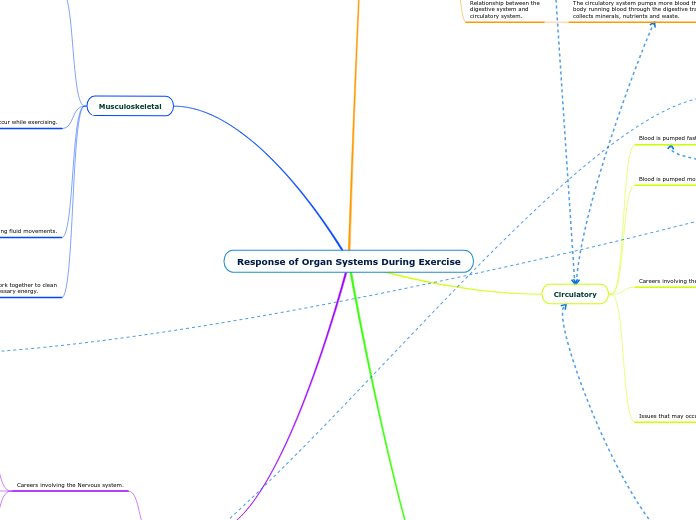Response of Organ Systems During Exercise
Digestive
Your body does not use energy to digest while exercising.
Causes digestion to slow.
Energy is saved for muscles and lungs to use to increase efficiency of other systems.
Careers involving the digestive system.
Hepatologist
Incorporates the study of liver, pancreas, gallbladder, biliary tree and as well as managing their respective disorders.
Gastroenterologist.
Diagnoses and treats issues concerning the stomach and intestine.
Blood is diverted to your muscles and lungs.
Blood flow increases throughout the body.
Metabolism is increased for the duration of the exercise.
Blood is circulated throughout the digestive system.
Blood picks up remaining nutrients from your last meal.
Blood then carries nutrients and minerals throughout the body.
Blood also collects and carries away waste products.
Issues that may occur while
exercising.
It you have eaten a big meal before the session, it can lead to...
Vomiting.
Nausea.
Failure to digest big
loads.
Very intense exercising can lead to...
Heartburn.
Diarrhea.
Gastrointestinal bleeding.
Relationship between the
digestive system and
circulatory system.
The circulatory system pumps more blood throughout the body running blood through the digestive track. The blood collects minerals, nutrients and waste.
Circulatory
Blood is pumped faster.
This increases heart rate.
Blood is pumped more efficiently.
More blood surges throughout the body.
Blood is pumped more into muscles and lungs.
Careers involving the Circulatory system.
Cardiac surgeon.
A cardiac surgeon is someone who specializes in surgeries
within the thoracic region mainly work with lungs, heart and other key structures.
Hematologist.
Treating, diagnosing and prevention of diseases related to blood.
Echocardiographer.
Using ultrasounds to investigate the heart.
Issues that may occur while exercising.
Very intense activity can lead to cardiac arrest of not moderated.
There is a slight chance arrhythmia may cause a heart attack
which can be fatal.
Respiratory
Respiratory system relies on circulatory system to deliver oxygen it gathers.
Removes carbon dioxide from contracting muscles.
Oxygen is then moved into the muscles.
Oxygen ventilation is increased.
Contribute to acid base balance.
Regulate fluid and temperature balancing.
Careers involving the Respiratory system.
Pediatric Respiratory Care Specialist.
A pediatric specialist monitors, diagnoses
and treats younger patients.
Registered Respiratory Therapist.
A doctor who treats critical issues involving the circulatory system.
Adult Critical Care Specialty.
Issues that may occur while exercising.
Intense workouts can lead to...
Coughing.
Wheezing.
Shortness of breath.
Exhaustion.
Musculoskeletal
Careers involving the Musculoskeletal system.
Chiropractor.
A therapist that specializes in the manipulation of misaligned joints.
Massage Therapist.
A therapist that specializes in the movement of soft body tissue on another person.
Athletic Trainer.
Trains a person to prevent that person from making, preventing and treating athletic injuries.
Issues that may occur while exercising.
You can pull a muscle if not careful.
There is a chance you can sprain a joint.
You can prevent these from being careful and not overdoing your workouts or activities. Treatment can be offered by athletic trainers, massage therapists, chiropractors, etc.
Dislocation of a joint.
The muscles contract and stretch allowing fluid movements.
The need for oxygen is increased so the respiratory system sends oxygen to the muscles.
The circulatory system responds by sending more oxygen filled blood throughout the body.
The respiratory and circulatory systems work together to clean the muscles of waste and provide the necessary energy.
Nervous
Careers involving the Nervous system.
Neuroscientist.
General term for someone who studies the nervous system.
Neuroanatomist.
Studies the structure (anatomy) of the nervous system.
Neurobiologist.
Studies the biology of the nervous system.
Once exercising begins, the sympathetic nervous system is activated and the heart rate rises quickly.
As blood flow increases,
your brain is more exposed to oxygen
and nutrients.
In turn this nourishes the brain and keeps brain cells healthier.
With that, blood pressure
also rises.
